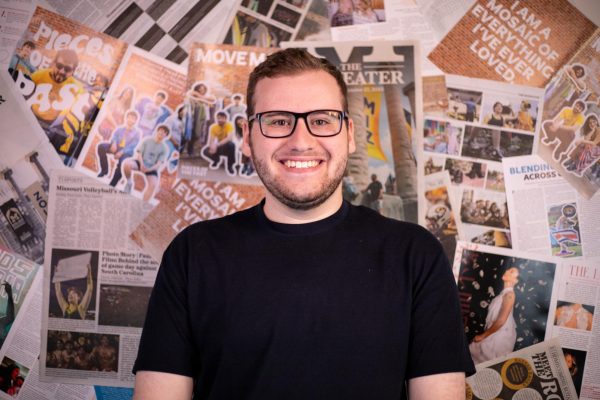Columbia residents gathered Saturday, Oct. 18, at the Boone County Courthouse to participate in one of the over 2,000 nationwide “No Kings” protests. Event organizers Columbia’s Mid-Missouri Solidarity Network called the demonstration a “peaceful mobilization” against President Trump’s “authoritarianism” in a press release sent on Oct. 13.
The protest began at 11 a.m. with music and speeches about preserving our democracy before the estimated 1,200 protestors started marching the 0.6-mile loop in downtown Columbia at 11:45 a.m. Speeches, signs and chants criticized Trump’s policies, highlighting issues like the Israel-Palestine conflict, transgender rights and immigration enforcement.

Carolyn Amparan, an event host representing the Sierra Club in the Mid-Missouri Solidarity Network, explained the meaning behind the phrase “No Kings.”
“We will not accept authoritarian government in the United States, and that’s really where the ‘No Kings’ comes from,” Amparan said. “We know we don’t have a king, but we don’t want one.”
State Rep. Gregg Bush, D-Boone, spoke at the protest about the effect the Trump administration’s policies have had on local health care. More broadly, he wanted people to understand that decisions from the White House come with consequences today and in the future.
“I’m standing here with my community, standing up for democracy, standing up for the ability to vote and standing against creeping authoritarianism,” Bush said. “And it’s not really creeping anymore. It’s running right for us, and if we don’t stand together, we’ll have a future that won’t be recognized.”
Ken Pearson, a Vietnam War veteran, believes that the “No Kings” movement is about Americans showing concern for their country.
“When you’ve served your country and you’re supposed to have defended democracy, and uphold the Constitution, then you see what’s going on, it’s pretty upsetting,” Pearson said. “The guy in office never served, and wants to be king. He ignores the Constitution.”
Some demonstrators said they wanted to make a visible stand against what they see as an erosion of democratic values. For Gary McKinney and his family, Trump’s policies have a direct impact on their everyday life. McKinney’s wife, Penelope, is from Mexico, so they came to support their biracial children and others living in fear.
“I think everyone can relate that your children and your wife are living in fear [because] they’re US citizens but have to carry a passport or a birth certificate everywhere they go because they’re scared,” he said.
McKinney added that their participation in the protest isn’t about anger, but patriotism.
“You’re being told we’re here because we hate America, but we’re here because we love America,” he continued. “It’s a shame that we’re being torn apart.”
In recent months, Trump has faced a lot of backlash over policies and executive orders that critics call unconstitutional or authoritarian. Federal courts have blocked several White House orders, including efforts to end birthright citizenship and to replace career civil servants in the bureaucracy with political appointees.
His administration has also been accused of illegally cutting congressionally approved foreign aid and federal funding, restricting freedom of the press for outlets like the Associated Press, weaponizing the Department of Justice to indict political opponents, purging civil rights of transgender people and expanding deportations through ICE without due process.
Civil rights groups and legal scholars say these actions test the limits of presidential power and blur the separation of powers between branches of government.
The “No Kings” movement first drew attention in June when more than 5 million Americans joined demonstrations nationwide. Saturday’s protest marked its return, focusing on what participants described as an effort to defend democracy amid growing fears of government overreach.




